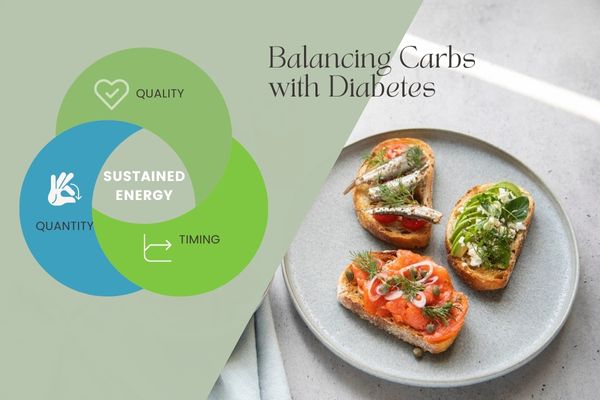
Have you been recently diagnosed with diabetes or impaired glucose tolerance? You may have wondered if a Mediterranean Diet is good for diabetes? Or perhaps your health professional has recommended you follow it? But how do you do that effectively? As dietitians, we know that not only what you eat, but how you eat it, has so much to do with effective diabetes prevention and management. So, I’m going to answer all these questions about the Mediterranean diet, particularly for managing chronic diseases such as type2 diabetes. I’m also going to give you some tips to help you (or remind you) about the ways to eat if you’re diabetic.
Before we do that though, it’s important to note the difference between type1 and type2 diabetes. Around 87% of people with diabetes in Australia have type2 diabetes, or diabetes mellitus. This is a condition where the pancreas is producing and releasing insulin, but there’s a disconnect. So, you may not make enough insulin, or the insulin you make is not working well. Whereas type 1 diabetes is a genetic condition present in around 9% of Australians. With type 1 diabetes, your body attacks the cells in your pancreas. So, your pancreas doesn’t release any insulin at all.
While diet is an important factor for both types, and both can benefit from a great diet, we need to treat them slightly differently. In type 2 diabetes, we can improve insulin resistance over time with good attention to health and managing blood sugar. Whereas those with type 1 diabetes will have the condition for life. So, people with type 1 diabetes need to take a bit more of a carb counting approach than those with type 2, as there won’t be that cumulative effect of good diet on insulin resistance over time.
Is the Mediterranean Diet good for diabetes prevention and management?
There is a growing body of evidence that supports the overall lifestyle intervention of the Mediterranean diet for diabetes. And, to support those people who have impaired glucose intolerance (ICT) – to prevent the onset of disease. We call the Med Diet a lifestyle intervention because what it is, is a nutritious and balanced way of eating and living, rather than a restrictive diet. It is one of only a handful of scientifically backed diets identified as being optimal for overall health and well-being.
So why might the Mediterranean Diet be good for those who have diabetes or impaired glucose tolerance?
In and of itself, a traditional Mediterranean diet has some major and extremely important factors:
- High plant-based foods
- High fish, low red meat
- High good fats, low in saturated and trans fats
- Low in refined sugar and processed foods
- Low in refined carbohydrates (low GI)
- High in antioxidant-rich foods

And this balance can play an important role when it comes to blood sugar. So there is so much research supporting the authentic Mediterranean diet in the prevention and management of diabetes. That tells us that the diet decreases our insulin resistance, it decreases our fasting blood sugar levels and decreases our HbA1c levels, which indicate the levels of glucose built up in our red blood cells. So, it’s not only effective at better regulating blood glucose over the short term, but over the longer term as well.
Not only that, but the Mediterranean diet is a key weight management strategy as well. And we know that excess weight is a key risk factor in the development and management of diabetes.
Watch my latest video, and keep reading below, to find out not only what to eat, but how to eat it for managing blood sugar. As always, if you would like support for managing your condition, reach out to book a 1:1 consultation.
Are carbs the enemy with diabetes?
Humans need carbohydrates. The right amount you need will depend on varying factors including your age, how active you are, and of course, whether you have a condition such as diabetes. When you eat carbohydrate foods, your digestive system breaks down the digestible carbohydrates and turns them into sugars, which then enter your bloodstream. Therefore, when you have diabetes, it’s important to be mindful of your carb consumption. But should you try to cut them out altogether?
Well firstly, let’s refresh on what carbohydrate foods are. They’re not just our simple sugars like lollies, chocolates, and soft drinks. Carbohydrate foods also incorporate our naturally occurring sugars as well. This includes whole grains, pasta, rice, muffins, cereals, and crackers. As well as starchy vegetables. This includes sweet potato, potato, and corn. Legumes and lentils are also a carbohydrate as well, as are dairy products such as milk, yoghurt, and some cheeses. Then you’ve got fruit of any format. Fresh, dried, tinned, canned, are all forms of sugar.
So, as you can imagine, if we cut out everything we don’t have much left to make up a balanced and sustainable diet. The key is in not thinking about carbs as our enemy in this situation. Careful carbohydrate management is possible, it’s about being more mindful of the quality and distribution of carbohydrate foods across your day. Also, the timing of carbs is important for people with diabetes. So, we need to balance all the above when managing carb consumption and ensuring we eat a balanced, nutritious diet. Lucky for us, a traditional Mediterranean diet typically offers the right balance of these aspects.

Carb quality and low glycaemic index foods
Glycaemic index (GI) talks about the quality of carbs, not necessarily the quantity of carbs. It tells us how fast or how slow the carbohydrate is going to break down into sugar molecules, and how fast or slow it will release into the blood. We want that process to be as slow as possible because that keeps us fuller for longer and it stabilises our blood sugar levels across the day. Low GI foods help us prevent that rollercoaster of sugar spikes and falls. If we were to graph our blood sugars, we don’t want the highs and the lows, we want stability across the day. Stability improves our satiety or how hungry we feel. It also improves mood, prevents irritability, and stabilises our energy levels.
So, if you’re diabetic, it’s in your best interests to be following a low GI diet, which the Mediterranean diet is. That is one of the first steps I’d recommend when trying to improve your diet with diabetes – making swaps from high GI food sources to low GI.
For instance, white bread to either a sourdough or a whole meal bread, swapping white potato to sweet potato or legumes. Swapping out your white cracker like a Salada to something with more fibre, like a Vita-Weat. Reaching for fresh fruit instead of dried, tinned or juiced.
Getting the carb quantities right with diabetes
Yet another reason not to consume high GI foods, is because it’s important to reduce the quantities of carbohydrates with diabetes. If you are fuelling your body with low GI carbs the fewer servings will be more likely to sustain you across the day. To give you an idea of quantity, we look at the Mediterranean diet (already abundant in low GI carbohydrates) and adjust the quantities to suit.
- Starchy vegetables. The Mediterranean diet typically recommends starchy vegetables such as sweet potato, potato, beans, and pumpkin at one to three times a week. If you’re looking to manage your blood sugar, you might aim for the lower end of that range.
- Wholegrains. We recommend whole grain consumption of around two to eight serves a day. But if we’re looking at stabilising blood sugars, aim for the lower end of that range as well. So, you might go two to four rather than two to eight serves a day.
- Dairy. An authentic Mediterranean diet includes two serves of dairy a day. Just be mindful that flavoured yoghurts are going to have excess sugar in there naturally. If you don’t eat dairy milk, consider which milk is lower GI. Almond milk will be lower GI than something like oat milk or rice milk.
- Fruit. Stick to fresh fruit as your source and aim for one to two serves a day.
Timing meals for stable energy
The last factor in managing carbohydrate consumption with diabetes, is the timing. Is your distribution of carbs stable across the day? What we don’t want to do is load up on a high-carb meal, then restrict carbs for the next meal. While you might think you’re doing your blood sugar a favour, what’s happening is you’re creating that roller coaster of sugar spikes. Remember, what we’re aiming for is stable energy.
What’s great about following an authentic Mediterranean diet, is the emphasis on high-quality, low GI carbohydrates with each meal. We typically have smaller amounts of carbohydrate but spread out across the day. Following the Med Diet at the lower end of the carb recommendations will help you hit the right quantities as well as offer a highly nutritious, quality carbohydrate. The small, regular consumption helps you get the timing right for sustained release.
As always, it’s best to avoid severe restriction when managing diabetes, or with any path to health and wellbeing. It’s about the quality, quantity, and timing of carbohydrates when you have diabetes or are pre-diabetic. Remember, carbs are not the enemy, we need them in the diet. It’s about managing them and achieving balance. This aspect is enjoyable, and feels natural, when following an authentic Mediterranean Diet.
Dietary support for diabetes
Do you have type 1 or type 2 diabetes? Or impaired glucose tolerance (IGT)? We are passionate about helping you navigate your condition with diet. With 30 years of experience in helping diabetic patients, we aim to empower you with practical, real-world advice and individualised solutions tailored to your lifestyle and tastes.
DISCLAIMER:
The content in this article is not intended as medical advice. It is also of a general nature and is not tailored to your individual circumstances. A 1:1 consultation is always the best approach. Please contact our clinic to discuss your unique situation and get an individualised plan for you.
